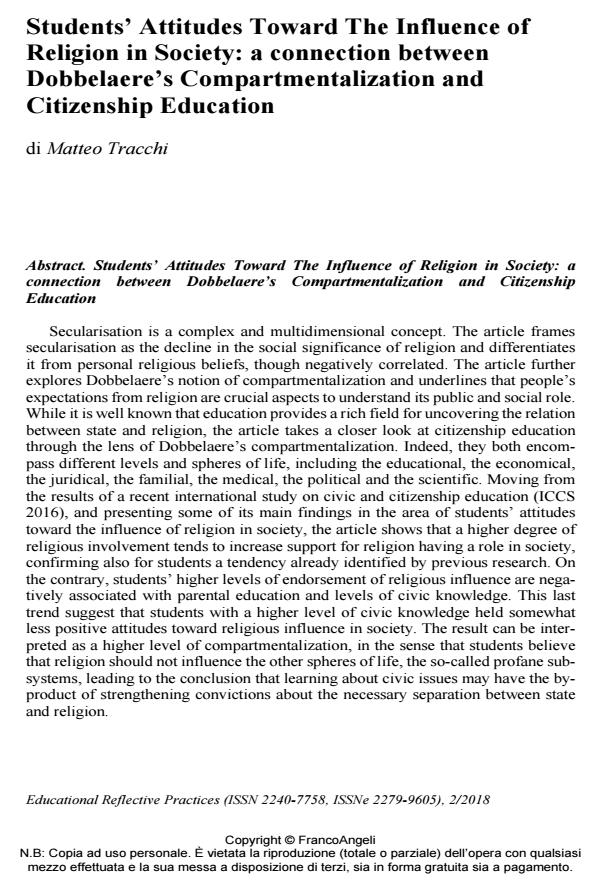Students’ Attitudes Toward The Influence of Religion in Society: a connection between Dobbelaere’s Compartmentalization and Citizenship Education
Journal title EDUCATIONAL REFLECTIVE PRACTICES
Author/s Matteo Tracchi
Publishing Year 2019 Issue 2018/2
Language English Pages 14 P. 244-257 File size 192 KB
DOI 10.3280/ERP2018-002016
DOI is like a bar code for intellectual property: to have more infomation
click here
Below, you can see the article first page
If you want to buy this article in PDF format, you can do it, following the instructions to buy download credits

FrancoAngeli is member of Publishers International Linking Association, Inc (PILA), a not-for-profit association which run the CrossRef service enabling links to and from online scholarly content.
Secularisation is a complex and multidimensional concept. The article frames secularisation as the decline in the social significance of religion and differentiates it from personal religious beliefs, though negatively correlated. The article further explores Dobbelaere’s notion of compartmentalization and underlines that people’s expectations from religion are crucial aspects to understand its public and social role. While it is well known that education provides a rich field for uncovering the relation between state and religion, the article takes a closer look at citizenship education through the lens of Dobbelaere’s compartmentalization. Indeed, they both encompass different levels and spheres of life, including the educational, the economical, the juridical, the familial, the medical, the political and the scientific. Moving from the results of a recent international study on civic and citizenship education (ICCS 2016), and presenting some of its main findings in the area of students’ attitudes toward the influence of religion in society, the article shows that a higher degree of religious involvement tends to increase support for religion having a role in society, confirming also for students a tendency already identified by previous research. On the contrary, students’ higher levels of endorsement of religious influence are negatively associated with parental education and levels of civic knowledge. This last trend suggest that students with a higher level of civic knowledge held somewhat less positive attitudes toward religious influence in society. The result can be interpreted as a higher level of compartmentalization, in the sense that students believe that religion should not influence the other spheres of life, the so-called profane sub-systems, leading to the conclusion that learning about civic issues may have the by-product of strengthening convictions about the necessary separation between state and religion.
Matteo Tracchi, Students’ Attitudes Toward The Influence of Religion in Society: a connection between Dobbelaere’s Compartmentalization and Citizenship Education in "EDUCATIONAL REFLECTIVE PRACTICES" 2/2018, pp 244-257, DOI: 10.3280/ERP2018-002016